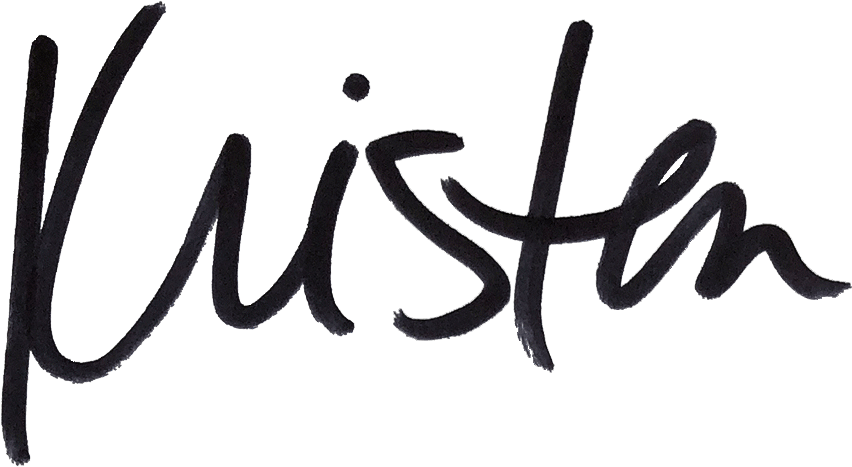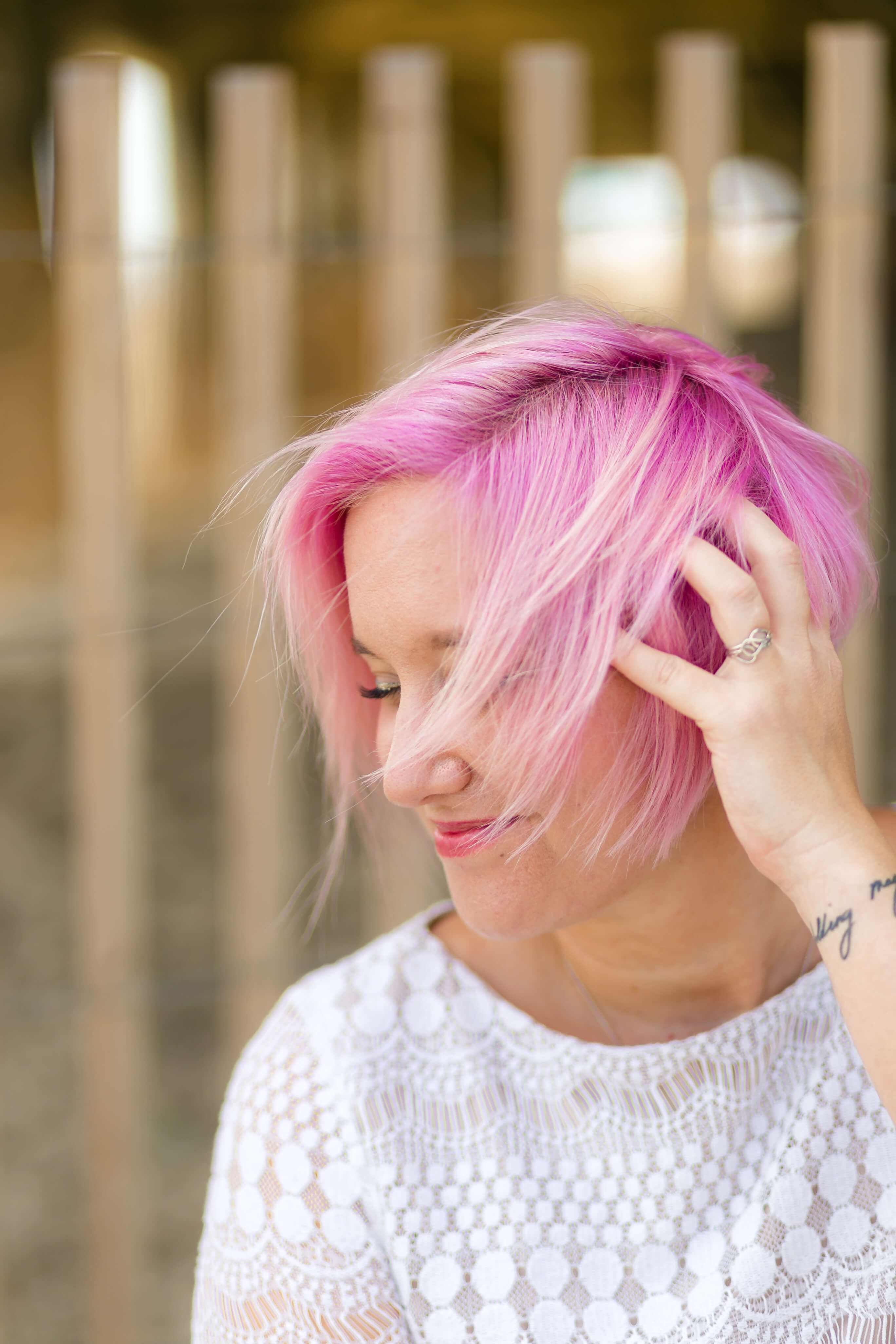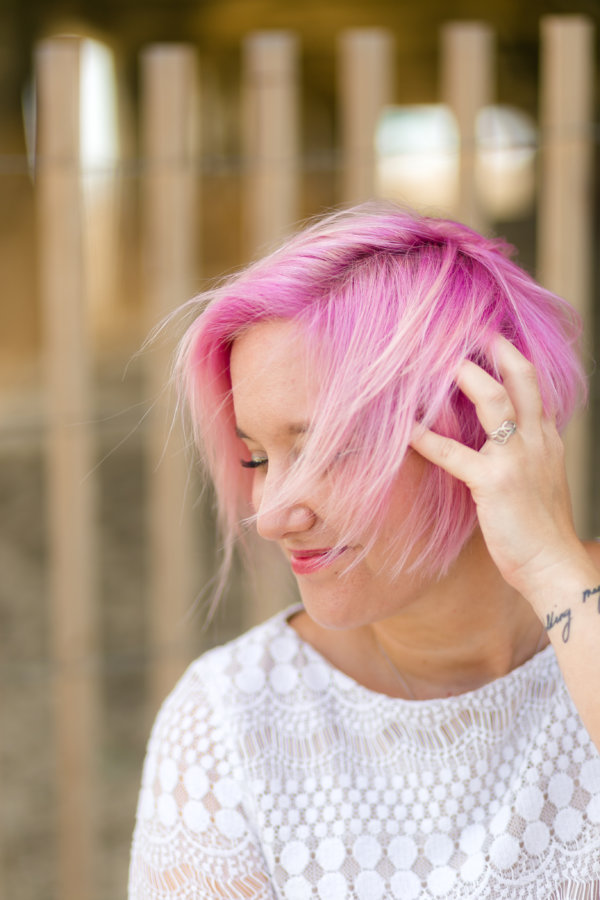Psst! This is an episode of That’s What She Said, my podcast! You can listen in below or keep reading and I’ll tell all.
When I talk with my peeps 1-on-1 about being a little more vulnerable in business, they freak out. They imagine a world in which every secret they’ve ever had is laid bare and then featured on a reality show that’s beamed into every home on the planet — AND it’s shot in HD so that every pore on their face has its own character name and story line.
Vulnerability doesn’t have to happen all at once.
You don’t have to go from being a master of mystique to spilling your secrets in one fell swoop. Often, the first steps into vulnerability will look like having your face on your website. Your face in a headshot without your partner, your kids, your dog, your tools of the trade, and/or your cat(s). Just you.
Add your full name, your location on the planet, and your phone number or e-mail address so peeps can actually contact you, et voila! You’re 30% more visible than you were at the beginning of this article.
When you’re even a shade more visible, you’ll be tempted to retreat and stop making the cutting edge work that’s calling to your spirit at this moment. Please don’t give in to that temptation to stop making, doing, or calling rad stuff into being.
Make the work, even if you don’t show it to anyone.
I write poems that no one sees all the time. (Here are the ones you can see.)
The willingness to be vulnerable with your SELF — with your own feelings, desires, insecurities, fears, and demons — is the only way to be comfortable sharing any of your vulnerable bits with anyone, ever.
In other words: don’t self censor.
Even if you only make stuff that lives in a closet or drawer or under a bed, you’re much further along than those who let their best and most vital work languish in their minds, never to see the light of day.
This step is impossible to view from the outside and no one can possibly hold you accountable for doing it, so I can only say it here and hope you hear me: don’t self censor.
Don’t self censor, don’t self censor, don’t self censor.
The parts of yourself that you’re most afraid to show to others will often be the parts that are embraced with the most love.
I started writing about my struggles with depression in 2013. I was certain that somehow the world would shatter, people would stop hiring me, and I’d be fending off flaming bags of dog turds for writing that article. (All roads led to homeless and penniless in my mind.)
Instead, people wrote kind notes. They sent me e-mails and letters and they’ve hugged me upon meeting to let me know that I helped. Years later, I still get thank you notes for that original article.
Oh and, that first article didn’t ‘do’ anything, either. It didn’t end with 84 Steps to End Your Depression Forever! It simply acknowledged my ongoing struggles with mental illness and let my peeps know that I was still alive. (Please remember this when you’re tempted to believe you’re not being ‘useful’ enough.)
Further: you can unfold by degrees.
Every relationship begins as two strangers meeting. Trust deepens over time.
From that first article with depression, it took years for me to go deeper: keeping the wolf at bay, hard-won depression tactics you can actually use, and the depression chronicles.
Other notable spots in the unfolding-by-degrees: 100 ways I’m broken, magic often feels like broken, and coming out of the spiritual closet.
I’ve answered questions in interviews this year that would have completely broken me five years ago. (This interview comes to mind.) Now, I just take a deep breath and tell the truth.
You don’t have to share your experiences in the present.
It took a full a full year for me to talk about my divorce anywhere, in any capacity. It took two years for me to admit the full cost of having hosted Brand Camp publicly.
I had depression for more than a decade before I talked about it with anyone other than my doctor and my best friend.
Vulnerability means, in the words of either Brene Brown or Glennon Doyle or both in some class they taught that’s no longer online — writing from our scars, not our wounds.
You don’t have to share your gaping wounds, but you can write/sew/dance/make/leap/film/photograph your way through them. You can take notes to use as fodder. You can keep an open list of ‘This Will Be Funny Someday’ vignettes on your computer. You can move through a tragedy of any kind knowing that someday, somehow, this, too will be a scar.
You don’t have to accept feedback.
When you’re putting work in the world, you’re not required to ask for or to accept feedback of any kind.
You can have teachers and mentors. Or not.
You can keep a handful of trusted advisors close to you. Or not.
You are in no way, not once not ever, required to hear the feedback of the critics or of total strangers. This especially applies to completely subjective works of all kinds.
Your watercolors are too smudgy? Who the fuck cares.
Poems too complicated/accessible/modern/traditional? Write ’em anyway.
You’re too loud/soft/dumpy/big/small/timid/brash? YUP. And?
The minute you let someone else’s opinions matter more than your own internal barometer, your work gets diluted.
Are you pushing your own limits?
Do you stand beside what you’ve made?
Would your past self be proud of what you’ve created?
The answers to those questions are far more important than whether someone, somewhere, on the internet approves. (Personally, I’ve got three people I trust to look stuff over and tell me where/if it’s falling down. I run harsh critique through those same three people to see if it’s valid or if it’s just trolling. I ask my clients for feedback once they’ve worked with me and address their concerns one-on-one. This isn’t to say that I don’t accept feedback, only that you, dear human, are not required to ask for it at any point. Sometimes work is better when it’s yours and only yours. Too often, we give others’ opinions far more sway than our own at some delicate point when the aliveness of the whole project hangs in the balance.)
When it comes to bringing your work to the public, start with a sure thing.
I sell every single book, program, product, class, whozeewhatzit or thingamabob I make to a sure thing before I release it to the general public. Meaning, I make a thing and then ask one of my favorite peeps to buy it, knowing that the person will say ‘yes.’
This takes away the vulnerability of ‘OH GOD WHAT IF I DON’T SELL *ANY* OF THAT THING’ and frees me up to release my work into the world with less stress about how it will perform financially.
If you want to sell a new thing, start by hitting up the people who told you to make that thing in the first place. If they’ve bothered you to teach yoga for years and now you’ve got classes on the calendar, ask ’em to come. They’ve been hounding you to paint, and you’ve just finished a bunch of pieces? Ask ’em to buy.
Ask, ask, ask. And, um.
Asking is always vulnerable.
It’s somehow easier to take on a task if you know it’s difficult. Thus, this is me telling you that you’re not broken or weird if you find asking for help and/or a sale to be practically impossible. The good news is that it gets easier with time and practice. Where once I felt like I was going to puke every single time a person e-mailed to ask about hiring me, I can now report that I feel only a brief wibbliness in my belly before answering the message and signing ’em up for the right offering. (Related: you could probably use this breathwork class.)
Finally: there are laws, there are rules, and there are opinions. Distinguish between the three carefully.
People will take it upon themselves to give you advice and to ‘look out for you’ in many ways.
Someone once told me that calling myself an orphan hugger was the most offensive thing she’d ever seen and made me look “hopelessly naive.” I’d just spent months in countries literally hugging orphans and was merely being accurate.
Other opinions! People have told me how inappropriate it was for me to mention the shaving of legs (SUPPORTING THE PATRIARCHY!), how completely wrong it was for me to take products off the market (HOW DARE YOU NOT TAKE MY MONEY), and the ways my use of strong language is offensive (yawn). Related: what to do when strangers are mean to you on the internet.
They’ve sent me long, long lists of reasons they’re unsubscribing.
…and I’m still here.
Still alive, still vulnerable, still doing my best to avoid self censoring.
Still taking a stand for the introverts, those called to the depths, and those who are sensitive AF and learning to live with it.
Still helping creatives do their big important magnificent brutal difficult lovely work in the world.
And still writing, too.
P.S. 29 ways to stop hiding. And what to do when success equals panic.




